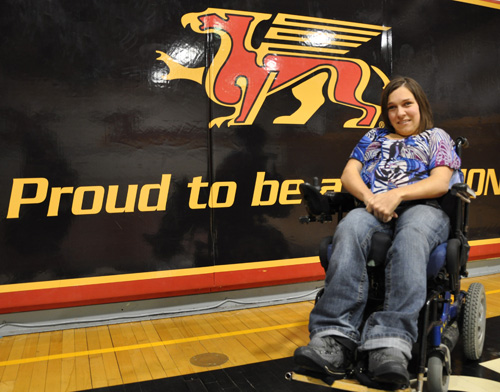
Chantal Huinink has a physical disability that requires her to use a wheelchair, but that hasn’t stopped her from completing an honours BA in psychology with a minor in family and child studies. She is one of more than 1,000 University of Guelph students with physical, mental or learning disabilities who rely on services provided by the Centre for Students with Disabilities (CSD) to help them succeed academically.
As a peer helper at CSD, Huinink counsels other students with disabilities. Most have the same concerns about university life as other students: Will I make friends? Will I get good grades? How do I balance my academic and social life?
“They’re all the same concerns everyone else has,” she says. “They’re just a bit more complicated with a disability. Becoming more independent is difficult for anyone, whether they have a disability or not.”
She advises prospective students with disabilities to consider attending U of G because of the wide variety of services and accommodations available to them. Before students start their first year, they can attend orientation programs to help ease the transition from high school to university. The pre-flight program gives students with learning disabilities the opportunity to experience life on campus for a week by living in residence, attending a mock lecture and writing a mock exam.
CSD also works with other University units to ensure that a student’s needs are met. Student Housing Services helps them find appropriate accommodations. Students with visual impairments, for example, are provided with sight guides and housed in residences located centrally on campus so they don’t need to cross busy streets. Accessibility services offered by the University of Guelph Library include adaptive software and alternate-format text services that allow students to order course materials in a format that is easier for them to use.
When students register with CSD, they are asked to provide medical documentation of their disability so they can receive services that fit their needs. Huinink has a personal attendant to help her with day-to-day tasks as well as a scribe to assist with writing assignments, tests and exams. She also has access to volunteer note-takers who photocopy their lecture notes for her.
“They make going to school with a disability normal,” she says, adding that CSD focuses on the unique needs of students with disabilities. “Guelph has a very individualistic model.”
That model is also holistic in its approach to students with special needs, adds Barry Wheeler, a CSD adviser. “We look at the whole picture,” he says. “Their general well-being is very important to us.”
In 1990, the provincial government mandated all universities to accommodate students with disabilities and provided the funding to do so. Since then, students like Huinink have more opportunities than ever before. She plans to attend graduate school with the intention of becoming an advocate for people with disabilities and other marginalized groups.
“I would like to be a role model,” she says. “Hopefully, a positive one.”